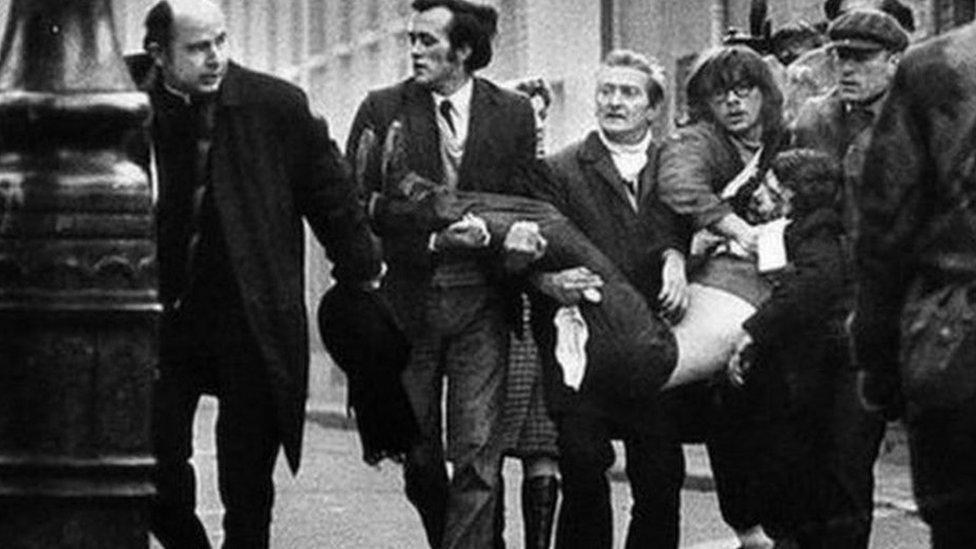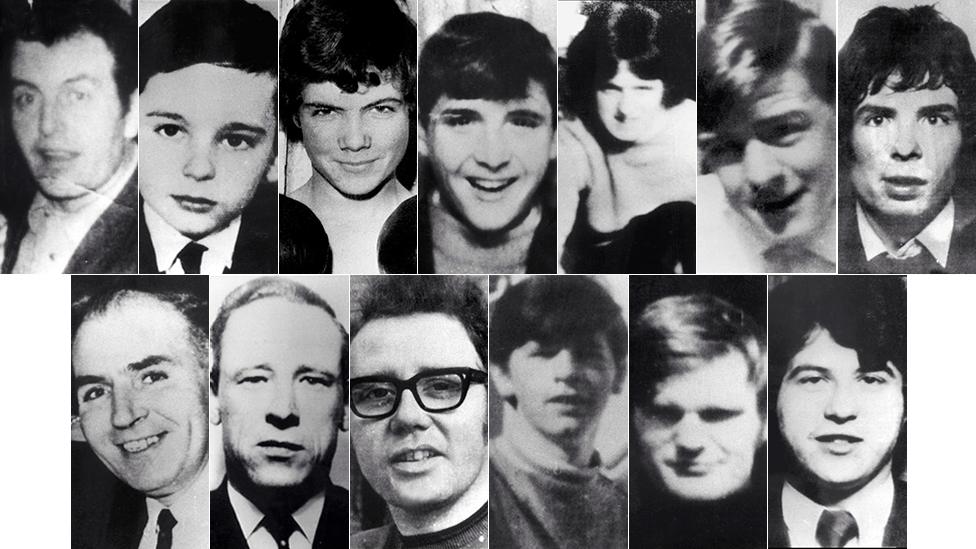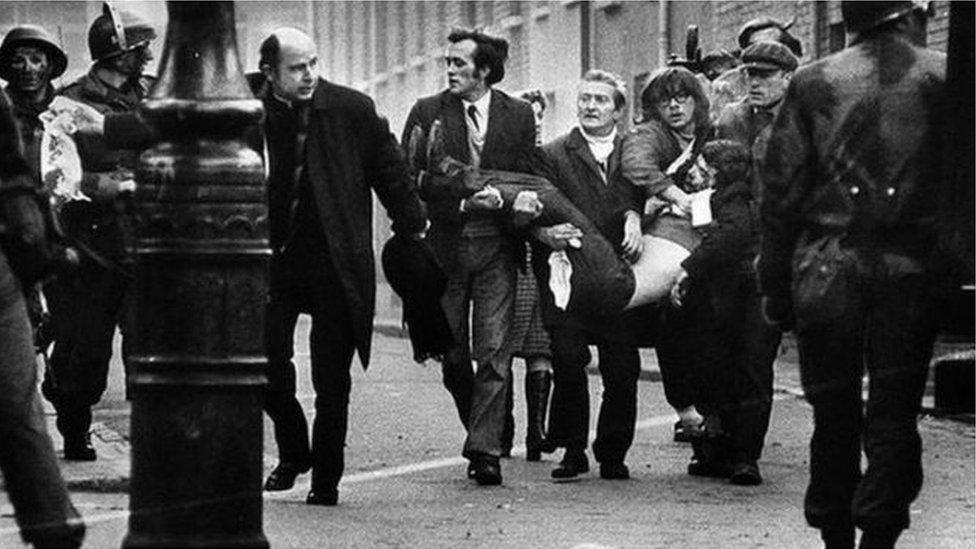Bloody Sunday: No further charges against former soldiers
- Published

Thirteen people were killed and 15 wounded on Bloody Sunday
The Public Prosecution Service has stuck to its original decision to bring charges against no more than one soldier in relation to Bloody Sunday.
It followed a review of the cases of 15 veterans, who it determined there should be no action against last year.
Thirteen people were killed and 15 were wounded when the Army opened fire on civil rights demonstrators in Londonderry in January 1972.
One man, Soldier F, remains the sole individual facing court.
The reviews were requested by the families of some of the victims.
Their solicitors say they are likely to challenge the outcome by way of a judicial review.
The Taoiseach (Irish PM) Micheál Martin said space should now be given to families to decide where to challenge the decision in the High Court.
Speaking in the Dáil on Tuesday afternoon, Mr Martin expressed his "deep disappointment" with the PPS decision and said it will "bring back pain and loss" for the Bloody Sunday victims and families.
'Wholly impartially'
No new evidence was submitted for the reviews and solicitors for the families sent detailed submissions to the PPS setting out why they believed the decisions were wrong.
They believe about 10 other soldiers should be facing prosecution for murder and attempted murder.
The PPS said the reviews were undertaken by its senior assistant director, Marianne O'Kane, who was not previously involved in the cases.
She looked at the deaths of 10 victims who died on Bloody Sunday, as well as 10 others wounded.
"I have concluded that the available evidence is insufficient to provide a reasonable prospect of conviction of any of the 15 soldiers who were the subjects of the reviews," she said.
"Accordingly, the decisions not to prosecute these 15 individuals all stand."

Top row, from left to right: Patrick 'Paddy' Doherty, Gerald Donaghey, John 'Jackie' Duddy, Hugh Gilmour, Michael Kelly, Michael McDaid, Kevin McElhinney. Bottom row, from left to right: Bernard McGuigan, Gerard McKinney, William McKinney, William Nash, James Wray, John Young
"I know that today's outcome will cause further upset to those who have pursued a long and determined journey for justice over almost five decades.
"I can only offer reassurance to all of the families and victims of Bloody Sunday, and the wider community, that my decisions were conducted wholly independently and impartially, and in accordance with the Code for Prosecutors."
'Deeply disappointed'
Kate Nash, whose brother William was among those killed, said she would not give up.
"I'm deeply disappointed that after a further review the correct decision's still not been reached," she said.
"I intend to carry on what I've been doing."
Her solicitor Darragh Mackin said they would now be seeking a judicial review of the decision.
"The issue of joint enterprise and conspiracy remains entirely up in the air and a decision has allowed to be taken premised on the actions of individuals and soldiers falling between the gaps of the grey area as to who actually fired the fatal shot," he said.
"As we all know in the issue of joint enterprise, where two or more individuals act collectively in a specific act, the charge can be brought."
'Very long walk'
John Kelly, whose brother Michael was killed on Bloody Sunday, said he was also "disappointed but not surprised by the decision".
"We are not finished," he said.
"Even though we have another knockback, and we have had many over the years, we will continue on to achieve truth and justice.
"Michael was 17, Michael cannot speak for himself. I will do it for him."
SDLP leader Colum Eastwood said the families would not be deterred now.
"They are people who have walked this very long walk, full of dignity and full of pride and not deterred by anybody".
On Tuesday, Sinn Féin President Mary-Lou McDonald called on the Taoiseach to raise the PPS decision with the UK Prime Minister Boris Johnson after another "very disappointing day" for the families "in their campaign for truth and justice".
DUP MP Gregory Campbell said he was not surprised by the PPS decision. He also questioned the potential cost of a judicial review.
"Is that going to mean further trauma and delay for all of those involved?" he asked.
"What is the outcome going to be?
"I think more and more people will be saying how much further is this going to go on, because there are families today across Northern Ireland who are still grieving."
The families also argue Soldier F, as he was known at the Bloody Sunday public inquiry, should be facing more charges.
He is to stand trial accused of murdering James Wray and William McKinney in Derry in 1972 and is further charged with five counts of attempted murder.
Four of the attempted murder charges relate to the wounding of Joseph Friel, Michael Quinn, Joe Mahon and Patrick O'Donnell.
The fifth relates to persons unknown.
